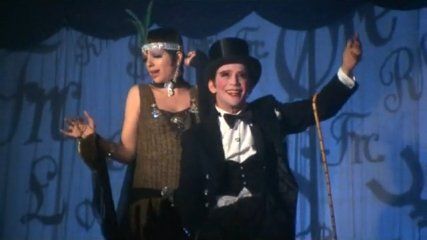You're better off without me, mein herr.

The story of Cabaret has been told so many times and so many different ways -- first in Christopher Isherwood's Berlin Stories, then in John Van Druten's play I Am a Camera and its subsequent screen adaptation, later in Kander and Ebb's Tony Award-winning Broadway musical, and finally in Bob Fosse's film version of same -- that it's impossible to say which is the definitive one. What is certain is that Fosse's 1972 film -- with its eight Academy Awards (including Fosse for Best Director, Liza Minnelli for Best Actress and Joel Grey for Best Supporting Actor) -- is unlikely to be surpassed. Sure, The Godfather may have denied it Best Picture, but that's about the only thing it was denied.
Set in the bustling Berlin of 1931, just two short years before the Nazis came to power, the film follows bisexual English doctoral student Michael York as he gets mixed up with a cabaret singer (Minnelli) who's desperate to become a big film star. Eventually they both become involved with the same man (Helmut Griem), a rich baron who showers them with gifts, although it must be said that Minnelli is the one on the receiving end of most of them. There's also a subplot about one of York's pupils (Fritz Wepper), a businessman who goes to him for English lessons, and his pursuit of a department store owner's daughter (Marisa Berenson) who suspects he only wants her for her money (sound familiar?). All the while, there are frequent cutaways to the Kit Kat Klub where Minnelli performs and the master of ceremonies (Grey) holds court, singing songs that frequently comment on the plot. Naturally it's one that gets darker as it goes along and National Socialism seeps into every aspect of German life. Suffice it to say, by the time Grey bids us "Auf Wiedersehen," the rot has already set in.